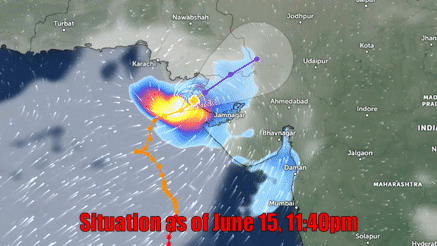IN an emergency, the best and the worst in human nature comes out for all to see. Unfortunately, the scenes witnessed on Wednesday and Thursday in Karachi’s Seaview area were shocking. They did not reflect well on the psyche of Karachiites. People made their way in huge numbers to the beach to ‘enjoy’ the sight of Mother Nature unleashing her wrath. All this happened as the administration and disaster management authorities issued warnings of the dire impact that Cyclone Biparjoy would have. Karachi may not have been directly in the line of the cyclone’s wrath, but the public’s attitude left much to be desired anyway. Anticipating the public’s tendency not to obey orders, Section 144 had been imposed and the police stationed on the spot. Yet nothing could stop the adventure-seekers out to have some fun.
The people did exactly what the authorities expected they would. How should one describe this cavalier behaviour? Federal Minister for Climate Change Sherry Rehman aptly termed it ‘disaster tourism’, while appealing to the people not to expose themselves to the danger. I will simply describe it as the height of stupidity and selfishness — after all the warnings had been issued.
The episode has left me wondering why our people behave in this bizarre manner. We still have to recover from last year’s catastrophic floods that left Sindh devastated. What is worse, the province is even now a ravaged place. With the exception of some areas where people have managed to reconstruct their homes without any official assistance and where life has begun to return to some semblance of normality, Sindh has a long way to go to return to the pre-2022 situation. Some villages destroyed then remain deserted today as their inhabitants have not returned. Many schools collapsed and were never replaced by new ones. I don’t know if the government has even carried out a survey and kept count of the schools that are no more. Where are the children and where are the teachers?
Nothing could stop the crowds from dashing to the seafront.
Today, we do not know what is in store for us. Post-cyclone reconstruction will add to the challenge. Even before the cyclone hit, ferocious waves had begun to show how helpless man is before the fury of the elements, especially in times when callous governments fail to fulfil their duties. Still, the authorities managed to evacuate 77,000 people to safe places. One of them is Saleem Dublo, a fisherman from Keti Bandar that was expected to be hit by the storm, who has single-handedly taken upon himself to save the mangroves that the government has chosen to neglect. Dublo knows that his bread and butter depends on the mangroves where the fish lay their eggs. When he returns home, will the mangroves he had planted still be there?
There are fishermen who are worried about their boats. Having been grounded for several days because of the rough weather in the Arabian Sea, they are not even sure if their boats will be recovered intact. Their boats are a valuable asset and the main source of their livelihood. In the absence of quays and platforms to anchor their vessels, the latter must have been battered beyond repair by the raging wind and waves.
It is in the backdrop of this situation that the Seaview crowds’ sense of adventure is misplaced. Again, I return to my original question: why? A number of answers come to mind. The crowds which had gathered did not understand the danger that lurked behind the waves, which were smashing against the Seaview wall. Although Karachi is the only major city in Pakistan that can boast of being located on the seafront, we seem to lack an understanding of the ocean. We know little about its sense of timing, its moody behaviour and how the ocean can be a soothing friend but also an enemy, which can drag you away forever. There are so many drowning deaths reported every year in Karachi.
Recklessness has penetrated the people’s temperament as life no longer appears to be a major investment worth preserving for the common man.
Most importantly, the government, media and opinion-makers have lost all credibility. People had to see the storm to believe it was really there. The elements of nature have not been helpful. Take the cyclone. We had been hearing about the storm but the forecast about the level of danger to the city kept changing. The same is the case in all walks of life. Few believe what is first announced. Even the mayor’s election in Karachi — a stormy affair itself — on the day the cyclone was to make landfall produced a familiar uncertainty and lack of credibility.
Such nonchalance and carelessness on the part of the public and lack of governmental credibility are a tragedy for society at large. Will anything now restore our faith in this country?
Published in Dawn, June 16th, 2023














































Dear visitor, the comments section is undergoing an overhaul and will return soon.